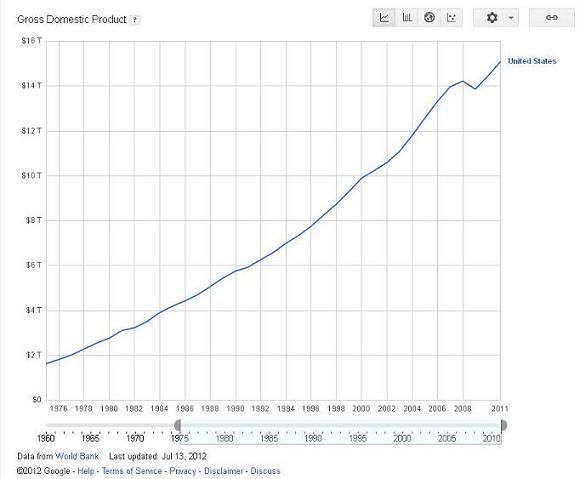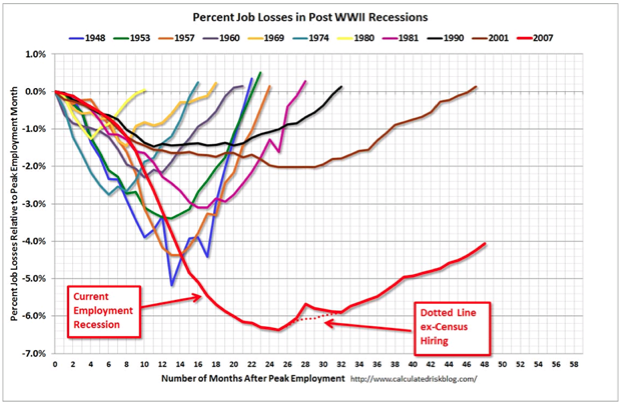Obama Adminstration Meta Discussion
Options
Replies
-
The state health exchanges won't be created until 2014 which is where the bulk of the cost stems from.
Yes, but the CBO has estimated that even after 2022 when ACA will be fully implemented and operating for some 8 years, it will reduce deficits.
http://www.cbo.gov/sites/default/files/cbofiles/attachments/43471-hr6079.pdf on page 21.
Again, this is a little confusing since it's couched in terms of repealing ACA via HR 6079, so when it says "HR 6079 increases the deficit" that means "ACA reduces the deficit."Relative to current law, enacting H.R. 6079 would, CBO estimates,
increase federal budget deficits in the decade following 2022. . .
. . . CBO estimates that the total increase in deficits during the
2023–2032 period from enacting H.R. 6079 would lie in a broad range
around one-half percent of GDP. CBO has not extrapolated that estimate
further into the future. However, in view of the projected budgetary effects
between 2023 and 2032, CBO anticipates that enacting H.R. 6079 would
probably continue to increase budget deficits relative to those under current
law in subsequent decades. . . .
According to the CBO, repealing ACA increases the deficit even in 2023 and beyond.0 -
To get back to the question about Reagan vs. Obama, take a look at the graph of GDP here:
http://www.google.com/publicdata/explore?ds=d5bncppjof8f9_&ctype=l&strail=false&bcs=d&nselm=h&met_y=ny_gdp_mktp_cd&scale_y=lin&ind_y=false&rdim=region&idim=country:USA&ifdim=region&tstart=177922800000&tend=1313996400000&hl=en&dl=en&ind=false&icfg&iconSize=0.5
The recession Reagan had to deal with is barely visible on that graph, while the Bush recession is huge.0 -
Unfortunately, your numbers are incorrect.
I don't have any numbers. I'm using the CBO's numbers, which are a month more recent than that ABC mishmash.
http://www.cbo.gov/publication/43471
It's really very simple:
Gross cost: $1,677 billion
Offsets: $506 billion
Net cost: $1,171 billion.
Medicare savings: $711 billion
Revenue increases: $569 billion
Net reduction in the deficit: $109 billion over 10 years.
The offsets are the revenue increases.
If they're not, your saying the government will receive $1 trillion dollars in taxes and expect to save $700B in Medicare costs, making this bill a $1.7T healthcare bill. When it was signed into law it was $930B. You are now saying the law was passed with over $1Trillion dollars in new taxes.0 -
The state health exchanges won't be created until 2014 which is where the bulk of the cost stems from.
Yes, but the CBO has estimated that even after 2022 when ACA will be fully implemented and operating for some 8 years, it will reduce deficits.
http://www.cbo.gov/sites/default/files/cbofiles/attachments/43471-hr6079.pdf on page 21.
Again, this is a little confusing since it's couched in terms of repealing ACA via HR 6079, so when it says "HR 6079 increases the deficit" that means "ACA reduces the deficit."Relative to current law, enacting H.R. 6079 would, CBO estimates,
increase federal budget deficits in the decade following 2022. . .
. . . CBO estimates that the total increase in deficits during the
2023–2032 period from enacting H.R. 6079 would lie in a broad range
around one-half percent of GDP. CBO has not extrapolated that estimate
further into the future. However, in view of the projected budgetary effects
between 2023 and 2032, CBO anticipates that enacting H.R. 6079 would
probably continue to increase budget deficits relative to those under current
law in subsequent decades. . . .
According to the CBO, repealing ACA increases the deficit even in 2023 and beyond.
Which is why I agree something needs to be done to fix healthcare, medicare, and medicaid.0 -
Have you read the CBO letter I'm getting all my numbers from? If not you're wasting my time. I'm only rephrasing their conclusions.The offsets are the revenue increases.
If they're not, your saying the government will receive $1 trillion dollars in taxes and expect to save $700B in Medicare costs, making this bill a $1.7T healthcare bill. When it was signed into law it was $930B. You are now saying the law was passed with over $1Trillion dollars in new taxes.0 -
Have you read the CBO letter I'm getting all my numbers from? If not you're wasting my time. I'm only rephrasing their conclusions.The offsets are the revenue increases.
If they're not, your saying the government will receive $1 trillion dollars in taxes and expect to save $700B in Medicare costs, making this bill a $1.7T healthcare bill. When it was signed into law it was $930B. You are now saying the law was passed with over $1Trillion dollars in new taxes.
Yes, I have read it. That is why I keep correcting you because your interpretation of the letter is incorrect.0 -
Then why do you say nonsense like "the offsets are the revenue increases"? They clearly are not.
The offsets are "penalty payments from employers and uninsured individuals, revenues from the excise tax on high-premium insurance plans, and net savings from other coverage-related effects." Although the number never explicitly appears in the letter, they are $506 billion as is clear from the difference between the gross and net cost numbers. (" H.R. 6079 would yield gross savings of an estimated $1,677 billion and net savings (after accounting for the offsets just mentioned) of $1,171 billion.")
The revenues are "provisions that are estimated to increase federal revenues (apart from the effect of provisions related to insurance coverage), mostly by increasing the Hospital Insurance (HI) payroll tax and extending it to net investment income for high- income taxpayers, and imposing fees or excise taxes on certain manufacturers and insurers." Those are explicitly pegged at $569 billion.0 -
Here's your trillion in taxes, A2O:Assuming that H.R. 6079 is enacted near the beginning of fiscal year 2013, CBO and JCT estimate that, on balance, the direct spending and revenue effects of enacting that legislation would cause a net increase in federal budget deficits of $109 billion over the 2013–2022 period. Specifically, we estimate that H.R. 6079 would reduce direct spending by $890 billion and reduce revenues by $1 trillion between 2013 and 2022, thus adding $109 billion to federal budget deficits over that period.
http://www.cbo.gov/publication/43473
This seems to be a different way to slice the same numbers and I honestly don't understand the difference. The $890 seems to be the cost increase minus the Medicare cost deruction. And the $1 trillion seems to be the offsets plus the revenue increases. But I can't get them numbers to work out exactly with the other Cbo numbers on HB 6079.0 -
Here's your trillion in taxes, A2O:Assuming that H.R. 6079 is enacted near the beginning of fiscal year 2013, CBO and JCT estimate that, on balance, the direct spending and revenue effects of enacting that legislation would cause a net increase in federal budget deficits of $109 billion over the 2013–2022 period. Specifically, we estimate that H.R. 6079 would reduce direct spending by $890 billion and reduce revenues by $1 trillion between 2013 and 2022, thus adding $109 billion to federal budget deficits over that period.
http://www.cbo.gov/publication/43473
This seems to be a different way to slice the same numbers and I honestly don't understand the difference. The $890 seems to be the cost increase minus the Medicare cost deruction. And the $1 trillion seems to be the offsets plus the revenue increases. But I can't get them numbers to work out exactly with the other Cbo numbers on HB 6079.
Interesting. I will have to look into it further. Thanks for the info.0 -
Nobody commented on it so I suspect nobody looked at the graph of GDP that I linked. Here it is:

Any more questions as to how come the recovery under Reagan in the earlier 80s was so much quicker than the recovery under Obama?
[Hint: We were in a much much deeper hole when Obama took office than when Reagan took office.]0 -
Nobody commented on it so I suspect nobody looked at the graph of GDP that I linked. Here it is:

Any more questions as to how come the recovery under Reagan in the earlier 80s was so much quicker than the recovery under Obama?
[Hint: We were in a much much deeper hole when Obama took office than when Reagan took office.]
You can't compare the two IMO. Different type of recession, different era, different economic structure going in, etc, etc. (I'm not saying this to criticize or praise anything Reagan did --just pointing out the two situations aren't similar).
Here is another illustration of the difference:
It might also be worth noting the that recessions in 1990 and 2001 show similar curves, although not to the depth of 2007. To me that also suggests the changing nature of recessions as the economy has changed over the past 20 years.0 -
You can't compare the two IMO. Different type of recession, different era, different economic structure going in, etc, etc. (I'm not saying this to criticize or praise anything Reagan did --just pointing out the two situations aren't similar).
Agreed, especially with wealth distribution:
This data is from the latest census numbers.0 -
I thought I'd mention this because A2O was talking about Obama's supposed war on coal.Coal miners lost pay when Mitt Romney visited their mine to promote coal jobs
http://www.cleveland.com/open/index.ssf/2012/08/coal_miners_lost_pay_when_mitt.html
WASHINGTON, D.C. -- When GOP presidential candidate Mitt Romney visited an Ohio coal mine this month to promote jobs in the coal industry, workers who appeared with him at the rally lost pay because their mine was shut down.
The Pepper Pike company that owns the Century Mine told workers that attending the Aug. 14 Romney event would be both mandatory and unpaid, a top company official said Monday morning in a West Virginia radio interview.
A group of employees who feared they'd be fired if they didn't attend the campaign rally in Beallsville, Ohio, complained about it to WWVA radio station talk show host David Blomquist. Blomquist discussed their beefs on the air Monday with Murray Energy Chief Financial Officer Rob Moore.
Moore told Blomquist that managers "communicated to our workforce that the attendance at the Romney event was mandatory, but no one was forced to attend." He said the company did not penalize no-shows.
Because the company's mine had to be shut down for "safety and security" reasons during Romney's visit, Moore confirmed workers were not paid that day. He said miners also lose pay when weather or power outages shut down the mine, and noted that federal election law doesn't let companies pay workers to attend political events.
. . . .
When contacted about the interview on Monday afternoon, Murray Energy spokesman Gary Broadbent emailed this statement: "Rob Moore made it abundantly clear that no employees were forced to attend the Romney event. All participation was, and always has been, completely voluntary."
Blomquist said that he got multiple emails and phone calls from Murray Energy workers who felt that they were intimidated into attending Romney's appearance. He said employees were told they'd have to forfeit the day's pay unless they could make up their missed hours on overtime or weekends. . . .
Not clear to me how an event can be both mandatory and voluntary.0 -
I'm not going to take up space by quoting the whole article, but why Rob Moore is not in jail -- or at the very least -- is a mystery to me. From what I read at the time, negligence by his company was directly responsible for the deaths of those miners in Utah.
It would be unfair to say he represents all republicans, but he certainly epitomizes the wing of corporate sociopaths who have found a home in the GOP and have the $$ to exert a lot of influence.0



